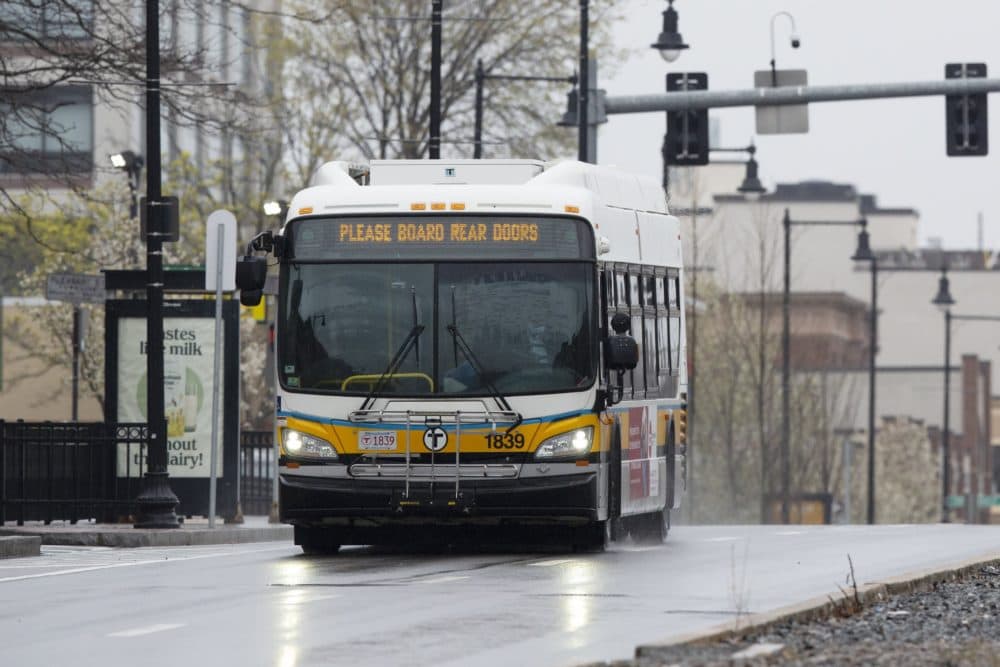Advertisement
Polls Shows Strong Opposition From Boston Residents To MBTA Service Cuts

The MBTA's proposed service cuts are highly unpopular with Massachusetts residents, according to a new survey by the MassINC Polling Group.
Of the poll's 1,340 respondents, 64% oppose cuts to commuter rail, ferry and bus service, and a similar number want the state to provide more funding to ease the MBTA's budget gap and avoid cuts.
And more than half of those surveyed fear the cuts will remain permanent even after the economy fully reopens.
State and transit officials pushed back against the poll on Thursday, insisting the proposed cuts were temporary and affected "non essential services."
MBTA General Manager Steve Poftak released a statement in response to the poll defending the service reduction plan as necessary "in order to preserve and protect service for those who depend most critically on the MBTA by reducing primarily non-essential services."
"The vast majority of MBTA service will continue, the proposed service changes are not permanent, and the MBTA will periodically realign service as feasible to match current and future ridership patterns when durable revenue is available for pay for such service," Poftak said.
According to the MBTA, the transit agency has been running the same level of service across all modes of transportation while ridership has declined from 1.3 million trips on an average weekday to 330,000.
Gov. Charlie Baker's office also questioned the decision not to poll residents on how they would prefer to pay for full MBTA service in the face of declining revenues.
"This poll fails to measure public support for the question that is actually at hand — should taxes be increased in order to operate a transit system that has seen its ridership decrease by 75%?" said Terry MacCormack, deputy communications director.
Advertisement
Steve Koczela, president of the MassINC Polling Group, joined WBUR’s Morning Edition to talk about the numbers.
Highlights from this interview have been lightly edited for clarity.
Interview Highlights
On where the main opposition to cuts is coming from
Well, I think the general concept of the cuts is just not a very popular thing. Of course, when you talk to people who use the T or who used the T before, that's a group that expresses particular opposition to the cuts just because in many cases, those are the people that want to use the T in the future.
On how remote work could change ridership on the T
We found that a majority of people who work say that they'd prefer to work from home at least a few times a week as the state begins to reopen. So if anything like the numbers of people who want to work from home do actually do that, it would be a shift in the number of people who are commuting.
On how much people say they'll use the T once vaccines become available
Well, in most cases, people say they would use it at least as much as they did before. There are some who would not, and I think some of that relates to the idea that people would prefer to work remotely for some portion of the week. But in most cases, people say they would use it at least as much as they used the T before.
I mean, some of it, too, really depends on what's available — when the vaccine is available and people are able to take it, then what transportation options are available? For some people, getting to and from Boston, the commuter rail, for instance, is the only choice where they are. So if it stops earlier, which is one of the proposed cuts or if it doesn't run on weekends — if some of the service has not been restored — then that really changes the options that they even can use. So then, you're either buying a car or you're getting a different job or you're moving. There's not really another choice at that point.
On if the opposition to cuts will make a political difference
Certainly, it's something where political leaders will take note. They're in a challenging situation trying to plan for a future where a lot of people don't really know what their future is going to hold yet. So they certainly are facing a difficult choice. But when you only have 27% support for the cuts, which is what the number is, and much higher levels of support for just increasing funding from the Legislature, it's at least enough that it will make political leaders take notice, I would think.
This article was originally published on December 03, 2020.
This segment aired on December 3, 2020.
